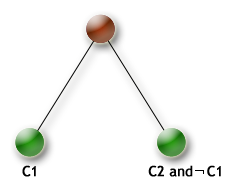settle_disjunction

function settle_disjunction(constraints: set of cpctr): cpbranching
function settle_disjunction(constraints: array(range) of cpctr): cpbranching
function settle_disjunction: cpbranching
function settle_disjunction(disjsel: function or string, constraints: set of cpctr): cpbranching
function settle_disjunction(disjsel: function or string, array(range) of cpctr): cpbranching
function settle_disjunction(disjsel: function or string): cpbranching
|
constraints
|
the disjunctions
|
|
disjsel
|
a disjunction selection function
|
model "Disjunctive scheduling with settle_disjunction"
uses "kalis", "mmsystem"
declarations
NBTASKS = 5
TASKS = 1..NBTASKS ! Set of tasks
DUR: array(TASKS) of integer ! Task durations
DUE: array(TASKS) of integer ! Due dates
WEIGHT: array(TASKS) of integer ! Weights of tasks
start: array(TASKS) of cpvar ! Start times
tmp: array(TASKS) of cpvar ! Aux. variable
tardiness: array(TASKS) of cpvar ! Tardiness
twt: cpvar ! Objective variable
zeroVar: cpvar ! 0-valued variable
Strategy: array(range) of cpbranching ! Branching strategy
end-declarations
DUR :: [21,53,95,55,34]
DUE :: [66,101,232,125,150]
WEIGHT :: [1,1,1,1,1]
setname(twt, "Total weighted tardiness")
zeroVar = 0
setname(zeroVar, "zeroVar")
forall (t in TASKS) do
start(t) >= 0
setname(start(t), "Start("+t+")")
tmp(t) = start(t) + DUR(t) - DUE(t)
setname(tardiness(t), "Tard("+t+")")
tardiness(t) = maximum({tmp(t),zeroVar})
end-do
twt = sum(t in TASKS) (WEIGHT(t) * tardiness(t))
! Create the disjunctive constraints
forall(t in 1..NBTASKS-1, s in t+1..NBTASKS)
(start(t) + DUR(t) <= start(s)) or
(start(s) + DUR(s) <= start(t))
! Define the branching strategy
Strategy(1):= settle_disjunction
Strategy(2):= split_domain(KALIS_LARGEST_MIN,KALIS_MIN_TO_MAX)
cp_set_branching(Strategy)
! Solve the problem
if not(cp_minimize(twt)) then
writeln("Problem is inconsistent")
exit(0)
end-if
forall (t in TASKS)
writeln(formattext("[%3d==>%3d]:\t %2d (%d)",start(t).sol,
start(t).sol + DUR(t), tardiness(t).sol, tmp(t).sol))
writeln("Total weighted tardiness: ", getsol(twt))
end-model
© 2001-2024 Fair Isaac Corporation. All rights reserved. This documentation is the property of Fair Isaac Corporation (“FICO”). Receipt or possession of this documentation does not convey rights to disclose, reproduce, make derivative works, use, or allow others to use it except solely for internal evaluation purposes to determine whether to purchase a license to the software described in this documentation, or as otherwise set forth in a written software license agreement between you and FICO (or a FICO affiliate). Use of this documentation and the software described in it must conform strictly to the foregoing permitted uses, and no other use is permitted.

